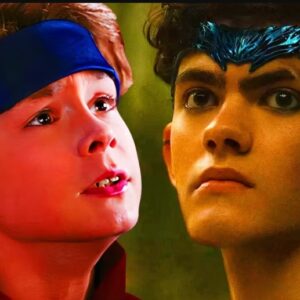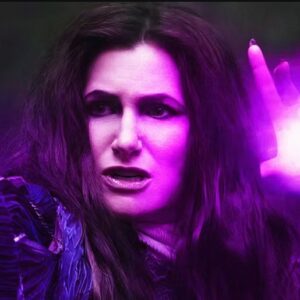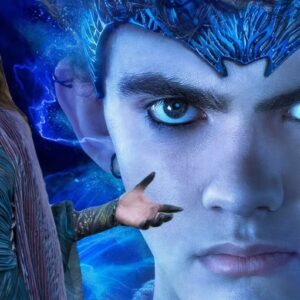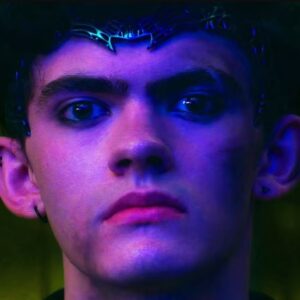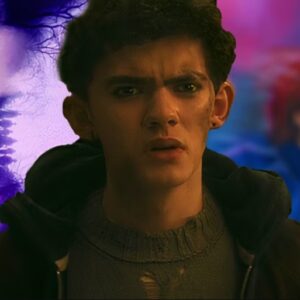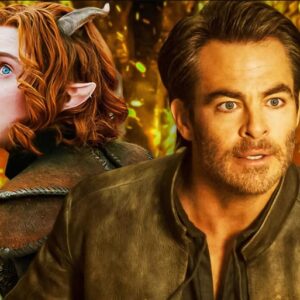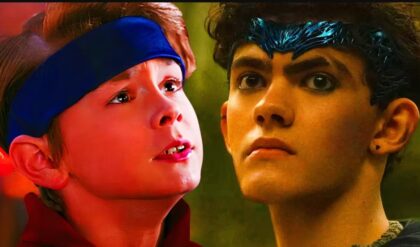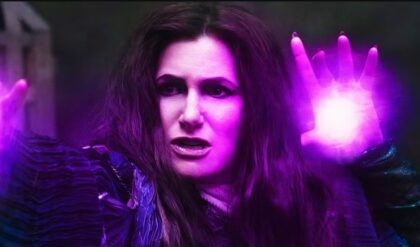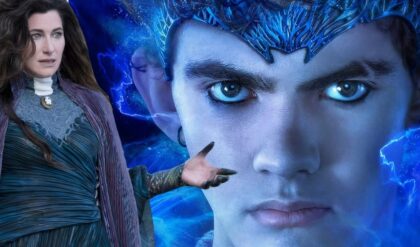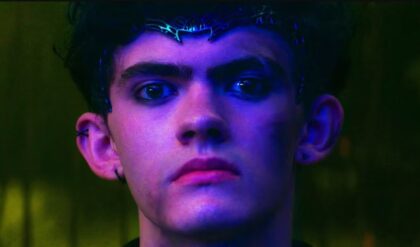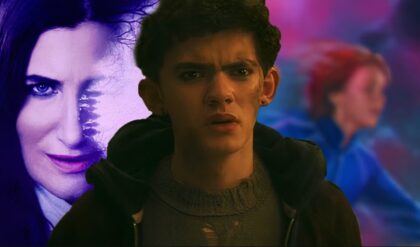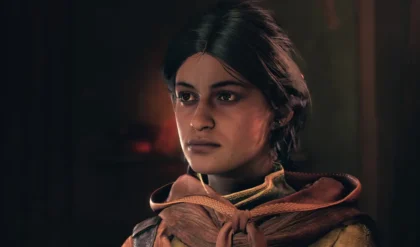Benjamin Walker, Charlie Vickers, Cynthia Addai-Robinson, Markella Kavenagh, Rob Aramayo, sat down with Complex to chat about the new season (which ended in October), the show’s epic battles, and fan criticism.

Image via Amazon Studios.
Middle Earth returned in full force this year with Season 2 of The Rings of Power. The Prime Video series, and the most expensive TV show ever produced, came back off the heels of its epic conclusion last season, as Sauron, played by Charlie Vickers, sets out to conquer the mortal world.
The stakes have been raised, though, with new characters, new challenges, terrains, and storylines to get through. “I can say that every performer, every crew member, has put in everything they can,” Vickers told Complex.
Tolkien’s Lord of the Rings franchise is a cult classic, but it was not immune to harsh reception from fans and critics alike. Season 1 was dubbed “a flop” by critics when it debuted, and Season 2 also faced similar criticism from fans on YouTube, who constantly ripped the series apart with every new episode (so were they just hate watching?).
“I get it,” Rob Aramayo, who plays Elrond, noted. “If you love the lore, you can allow the choices that we’ve made in the show to frustrate you if you want […] I would just implore people to think that these are a set of choices that we’ve made based on the limited material that we have in the Second Age,” Aramayo said.
As for the Tolkien Estate, they are apparently fans of the project, which is “a pretty good endorsement from where I’m sitting,” says Benjamin Walker.
We caught up with The Rings of Power stars Charlie Vickers (Sauron), Rob Aramayo (Elrond), Benjamin Walker (High King Gil-Galad), Cynthia Addai-Robinson (Queen Regent Míriel) and Markella Kavenagh (Nori Brandyfoot) about everything Season 2 – from behind-the-scenes moments to confronting fan hate, and everything in between.
(This interview has been edited in length for clarity.)
The Siege of Eregion was such a visual treat. There were over 1,500 Orcs in full costume and makeup, even the horses were wearing armor. What do you remember most about those days of production?
Rob Aramayo: Well, there were a lot of days. It was weeks and night
But I spent a lot of time in the costume not on set, to sort of try and work out how to move. — Charlie Vickers
shoots and all kinds of stuff, but you’d walk through, they had this big tent set up with all the orcs in full makeup, and they’re juggling.
Benjamin Walker: Playing cards, tweeting, sleeping, reading the newspaper; seeing an orc with spectacles on reading the newspaper is really cool.
Rob Aramayo: One of the weirdest things though, is there was this stunt guy called Shane, and I killed him about 12 times. But he’d always look so different. He’s like, “Hey, man.” It’s only after I’d stabbed him a couple of times, I’d look up and be like, “Oh, is that you? It’s you.” Just keep coming back.
Charlie, you’ve spoken about how Sauron’s shift to Annatar required a new physicality. Can you talk about more of the process of developing those changes for Sauron in season two?
Charlie Vickers: I think I had to try and link all the different changes to the same psychology as Halbrand and as Sauron really, because Annatar is Sauron, Halbrand is Sauron, they’re all the same person, all the same demigod. The ankle weights were a thing for a couple of weeks at the start, so I could try and feel the weight of the character and then my legs got too tired, so I got rid of ’em.
But I spent a lot of time in the costume not on set, to sort of try and work out how to move, and a lot of dialect coaching with Leith McPherson, who’s such a huge part of this show. She really helped me find the voice and through rehearsals, but I tried to link it to the truth of the character and everything that we created was for Celebrimbor.
One of my favorite scenes was from episode 6, when Celebrimbor walks inside and it transitions from day to night. I thought it was all done in post but BTS videos show it was done in real time, which is insane.
Charlie Vickers: It was very cool. And you do feel pressure in those scenes, particularly those ones because you know there’s a lot of things that can go wrong when you’re doing a sequence that’s 30 seconds and they’re not going to cut out of it.
I’m there and I’m Sauron and thinking, “Well, I’m destroying this city, one of the great Elvin strongholds and I hate the elves.” And it kind of gives you a lot of inspiration. — Charlie Vickers
So we did quite a few takes and it does the job for you. I’m there and I’m Sauron and thinking, “Well, I’m destroying this city, one of the great Elvin strongholds and I hate the elves.” And it kind of gives you a lot of inspiration because I’m just walking and there’s people running around. Things are exploding. It was very cool.
Benjamin, people might not know, but you also made an appearance as another character with the giant troll, Damrod. Can you talk about that experience?
Benjamin Walker: The irony is that I killed myself. Well, I didn’t know at the time that I was going to be voicing Damrod, but it was fun to reverse engineer it. We had so little time, and Damrod says so little, but how do you inject that with enough story and backstory that we care and we fear him, and also we’re along the ride of his death? He’s almost like this massive, scary, wandering, just dragging along like a big scary baby in a diaper. Maybe it’s because I have kids and they can be frightening. My little trolls. If you’re watching this. I love you.
Miriel is one of the few female leaderOr do things outside of copyediting still need to be done?s in the Tolkien universe. How do you feel about representing such a powerful figure in a world where female characters often have secondary roles?
Cynthia Addai-Robinson: I feel amazing and I feel very lucky and fortunate. Miriel is a canon character, but there is a lot of room and a lot of gaps in terms of her story or where the story takes her. So there was this great opportunity to collaborate with the vision of the showrunners and their plans for Miriel within this particular part of the story in Numenor.
It’s awesome to be a queen. — Cynthia Addai-Robinson
But it’s awesome. It’s awesome to be a queen, even if my queenship was sort of taken from me, but I then get to be Queen of the Sea. I, as a viewer, love watching female characters that I feel are well-rounded and strong, yet vulnerable and interesting. So I feel very honored to get to play that.
Markella, you and The Stranger share a very special relationship throughout the entire course of the season. How did you two build that chemistry offscreen to bring it into life?
Markella Kavenagh: We just spent so much time together. We were kind of constantly talking about their dynamic, and then as we were doing that, we became really good friends really quickly. And so I think that definitely carried through season two as well, and I’m really grateful for it. I think I’d also just moved to the UK and Daniel Weyman lives there, so he told me a lot where to go. We were good friends and we just spent a lot of time together and hopefully that translated onto the screen. There are times in our friendship where I’m like, “Oh, stop talking,” and Nori and The Stranger had that as well. So it’s lovely.
Celebrimbor is pivotal to Sauron’s plans. How did you and Charles navigate the moments of Annatar’s charm beginning to crack and Celebrimbor’s trust beginning to wane?
Charlie Vickers: I think we were pretty casual about it, to be honest. We knew the weight of the story we were telling and how important it is to a lot of Tolkien fans and we certainly didn’t underestimate that, but I think we just tried to keep it plotted quite specifically as we went through and we remained very light with each other and had a lot of fun and there was a lot of laughter. So we just wanted to make sure that the different dots that we were connecting had felt true to the disintegration of their relationship and not that Sauron was in charge the whole time, that Celebrimbor would do things that surprised Sauron. So it ran both ways.
Charlie, obviously we’ve gotta talk about episode eight. You’re very good with the bow and arrow.
Charlie Vickers: Yeah, I did a bit of training, like two sessions. Luckily you didn’t actually see much of my shooting on camera.
We remained very light with each other and had a lot of fun and there was a lot of laughter. — Charlie Vickers
I heard from the screening that some of the producers on set were asking for more blood, but I was watching it saying, “How could there be more blood?”
Charlie Vickers: Yeah, there was a lot of blood. That was the scene that really stood out to me as something because it’s canonical, his body being filled with arrows and raised up on the pike. It was very cool. It was something that I really looked forward to filming and Charles and I found the scene to be a huge challenge, but saw it for the first time and we were very proud of what we’d made.
You all have mentioned how the massive scale of production can kind of immerse you into Middle Earth. Were there any specific moments or locations during filming where you felt completely transported into Tolkien’s world?
Charlie Vickers: The Forge was pretty amazing because it was a completely practical set, there was nothing green screen. Maybe off the balcony on the horizon, they couldn’t build an Elvin kingdom outside the window, but they really put everything into making it complete. It was like a big stage for us. You could go in and out, walls would come out and cameras could come in different walls. So it was a really special place to be, and to be able to spend the whole season there filming was incredible and it was an absolute gift as an actor.
The internet can be an echo chamber for negative opinions. How do you think this affects the perception of the show and what’s your take on audiences who seem to actively root for its failure?
Rob Aramayo: I get it. I get it. If you love the lore, you can allow the choices that we’ve made in the show to frustrate you if you want. But I don’t know, I would just implore people to think that these are a set of choices that we’ve made based around the limited material that we have in the Second Age, and as any, this is what I think is great about Tolkien, it’s that if I make a point and I say, “Elves are like this.” Then you can say, “Well what about this story, and I can cite this, this,” and that discourse can be fun.
Benjamin Walker: And it’s dense enough to where both are supported,
It was like a big stage for us. — Charlie Vickers
Rob Aramayo: But if you weaponize it and it’s an attack, then it becomes more sort of problematic. So I don’t know. I would feel like I want to implore people to just look at the show.
Benjamin Walker: And I take comfort in the fact that the Tolkien Estate loves it. That’s a pretty good endorsement where I’m sitting.
Charlie Vickers: It’s strange because it seems that people care about the show hugely. And I think as a cast member, so much of the stuff is out of your control. We rock up as performers and we just do our job. And I can say that every performer, every crew member, has put in everything they can. And I think that you just have to kind of be like, “Well, I’ve given it my all and we’ve done the best that we can,” and let go of this weight of expectation and other people’s opinions.
There can be really constructive discourse around it and you learn things that might be really useful in going forward in terms of performance and whatever it might be to do with the show. But a lot of the things that are out there I just stay away from, because I know that it can be, as you say, like an echo chamber and things can get blown out of proportion. But the thing that we know is that people care and it means a lot to us that people care about the show enough to feel very passionate either way about it. And it’s not up to us. People can interpret it how they will, and that’s not for us to control.
I get it. I get it. If you love the lore, you can allow the choices that we’ve made in the show to frustrate you if you want. But I don’t know, I would just implore people to think that these are a set of choices that we’ve made based around the limited material that we have in the Second Age. — Rob Aramayo
Cynthia Addai-Robinson: I just think that literally everything that exists right now, you’re going to have lovers and you’re going to have haters. I think there’s literally no series, film, book, whatever have you, that is not going to have sort of vocal people again, that are into it or don’t get it or just want to actively troll it.
And truth be told, it’s literally what I just don’t think about when I’m focused on this. I can’t take that on. There’s nothing to be done in a way. I mean, that unfortunately is societal, it’s cultural, I suppose. It’s where we’re at, and I just feel like, what can you do in a way? I just feel like to focus on all of that, it’s a lot of noise and it doesn’t really bear any meaning as far as my process and my journey through this, and I certainly wouldn’t want to let that define this. We are working on this series, and it’s a long experience for us, but this is also our lives. So if I want to define it for myself, I’m not going to let it be defined by the internet, of all things.
You have to decide what is useful to you and what is just trash. — Cynthia Addai-Robinson
And I feel like my advice to anybody, because everybody now is subject to everybody’s opinion on anything, is: it’s just noise. You have to decide what is useful to you and what is just trash.
News
Why WandaVision’s Billy Maximoff Actor Didn’t Return For Agatha All Along
Billy Maximoff’s Wiccan has returned to the MCU, but Julian Hilliard did not return to the role for Agatha All Along following his debut in WandaVision. Kicking off the MCU’s Multiverse Saga and Phase 4, 2021’s WandaVision saw Elizabeth Olsen’s Scarlet Witch and Paul Bettany’s Vision…
Agatha All Along Episode 5 “Plot Hole” & Major Theory Addressed By Marvel Showrunner
Agatha All Along showrunner Jac Schaeffer opened up about the wild ride that was episode 5. Not only did the episode contain the much-awaited reveal of Teen’s identity, but it also featured the most shocking character death of the series so far. Since its…
New Agatha All Along Theory Reveals The True Power Of Joe Locke’s Teen, & Why He’s Only Now Revealing How Dangerous He Really Is
Agatha All Along may have revealed precisely how powerful Joe Locke’s Teen is, and why his powers are only just manifesting. Audiences have been captivated by the mysterious new character, simply known as Teen, played by Joe Locke, in Agatha All Along….
Who Is Joe Locke’s Mystery Marvel Character?
Agatha All Along introduced actor Joe Locke to the MCU, and his character has some major connections to Wanda Maximoff’s Scarlet Witch. Revealed to be a unique member of Agatha Harkness’ new coven of witches, Locke’s character is supporting Agatha in her…
Agatha All Along Episode 6 Ending Explained: What Billy Maximoff Wants From The Witches’ Road Revealed
Agatha All Along episode 6 reveals Billy Maximoff’s origins in the MCU by tying the show even closer to WandaVision, all while addressing several mysteries and teasing what is to come in the final three episodes. The ending of Agatha All Along episode 5 saw Teen confirmed…
Honor Among Thieves’ Streaming Success Reveals How A Sequel Can Avoid The Same Box Office Woes
The streaming success of Dungeons & Dragons: Honor Among Thieves reveals a clear way for the sequel to avoid the same box office woes as the original. Though it was highly popular, Honor Among Thieves’ disappointing box office has acted as a roadblock for…
End of content
No more pages to load
